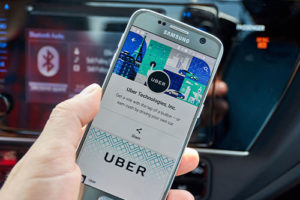 Countless New Jersey commuters now use rideshare services such as Uber and Lyft because they’re quicker, cheaper, and more convenient than regular taxis. Despite this, ridesharing is mired with legal confusion, particularly when one of the cars operating under its name gets involved in an accident.
Countless New Jersey commuters now use rideshare services such as Uber and Lyft because they’re quicker, cheaper, and more convenient than regular taxis. Despite this, ridesharing is mired with legal confusion, particularly when one of the cars operating under its name gets involved in an accident.
If you have been hurt in a serious ridesharing crash, you may be asking questions like: Who pays for my injuries? Whose insurance covers me? Can I hold Uber accountable?
The answers to these questions are not as straightforward as in a regular car accident. Claiming injury compensation in a rideshare accident can be extremely challenging for several unique reasons, which means you’ll want to be represented by a competent personal injury attorney. Let the Grossman Law Firm help you obtain the compensation you deserve in this complex legal situation.
Uber And Lyft Insurance In New Jersey
In a typical ridesharing model, the vehicles are not owned by the company – they are owned and driven by private individuals who register as rideshare drivers. These self-owned vehicles may get an inspection upon a company hiring a driver but continuing inspections cannot be depended on. It can be extremely difficult to determine liability when an accident happens. Insurance coverage questions and answers are many and muddled. Passengers often don’t know where to go when they get injured in an Uber.
Do rideshare companies insure their drivers and passengers? If you ask the companies themselves, this depends on the various “periods” of operation that a rideshare vehicle goes through. To give you an idea, here’s how a rideshare company generally structures their insurance coverage:
- During a period when the rideshare driver is offline or unavailable on the app, only the driver’s personal auto insurance policy will apply.
- During a period when the driver is available on the app or waiting for a ride request, the company may provide a contingent third-party coverage. This means that it will cover third-party damages (such as a passenger’s) if the driver’s personal auto insurance does not kick in.
- During a period when the driver is en route to a passenger or already has a passenger, the company will provide third-party coverage.
New Jersey enacted a law in 2017 that requires specific insurance coverages from rideshare companies. This law is § 20-280.4 (Financial responsibility) within Article 10A (Transportation Network Companies) of the Transportation Network Company Safety and Regulatory Act.
Rideshare company insurance should provide these minimums:
- If an accident occurred while rideshare driver has a passenger:
- $1.5 million coverage for bodily injury, property damage, and/or death of third party (e.g. a passenger)
- $10,000 medical coverage for the rideshare driver
- $1.5 million uninsured/underinsured motorist coverage.
- If an accident occurred while a rideshare driver is logged in to network but does not yet carry a passenger:
- $50,000 primary liability insurance per person or $100,000 per incident, plus $25,000 for property damage
- Primary personal injury protection normally required by New Jersey statutes
- Uninsured/underinsured motorist coverage normally required by New Jersey statutes.
Claiming Compensation From Rideshares Is Difficult – Here’s Why
It may sound reassuring that Uber, Lyft, and other rideshare companies have million-dollar auto insurance policies, and that NJ law mandates these coverages. But in reality, there are plenty of loopholes and insurance gaps that leave injured victims without their rightful compensation.
One gap occurs between the driver’s personal auto insurance and their commercial driving activity. Most personal policies specifically prohibit commercial driving or driving for hire. Registering as a Lyft or Uber driver may violate this clause and void the driver’s personal coverage. In the event that they injure a pedestrian or another driver while off-duty, they may not be covered by the rideshare company or by their personal auto insurance policy.
If the accident did occur while the driver was on-duty, injuries should ideally be covered by the company’s insurance. However, major companies like these are well-prepared to defend their profits from injury claims. You can expect their insurance adjusters to be highly experienced in downplaying your claim through various delay-or-deny tactics.
If you decide to pursue the case in court, you’ll likely be met with a strong defense team. In the first place, Uber and Lyft can easily distance themselves from any accident their drivers are involved in because these drivers are not employees of those companies but only contractors. This is one of the biggest ways rideshare companies are able to avoid liability.
Call The Grossman Law Firm
As challenging as it is to tackle a rideshare injury case, it is not impossible to win with a strategic and aggressive attorney. Our lawyers at The Grossman Law Firm have been skillfully fighting for New Jersey clients for decades now, resulting in tens of millions of dollars in settlements. We keep ourselves abreast of laws and developments around Uber, Lyft, and other ridesharing networks, so we can strategize accordingly for the compensation you deserve.
Your consultation is free and confidential. Call us at (732) 625-9494 today.
